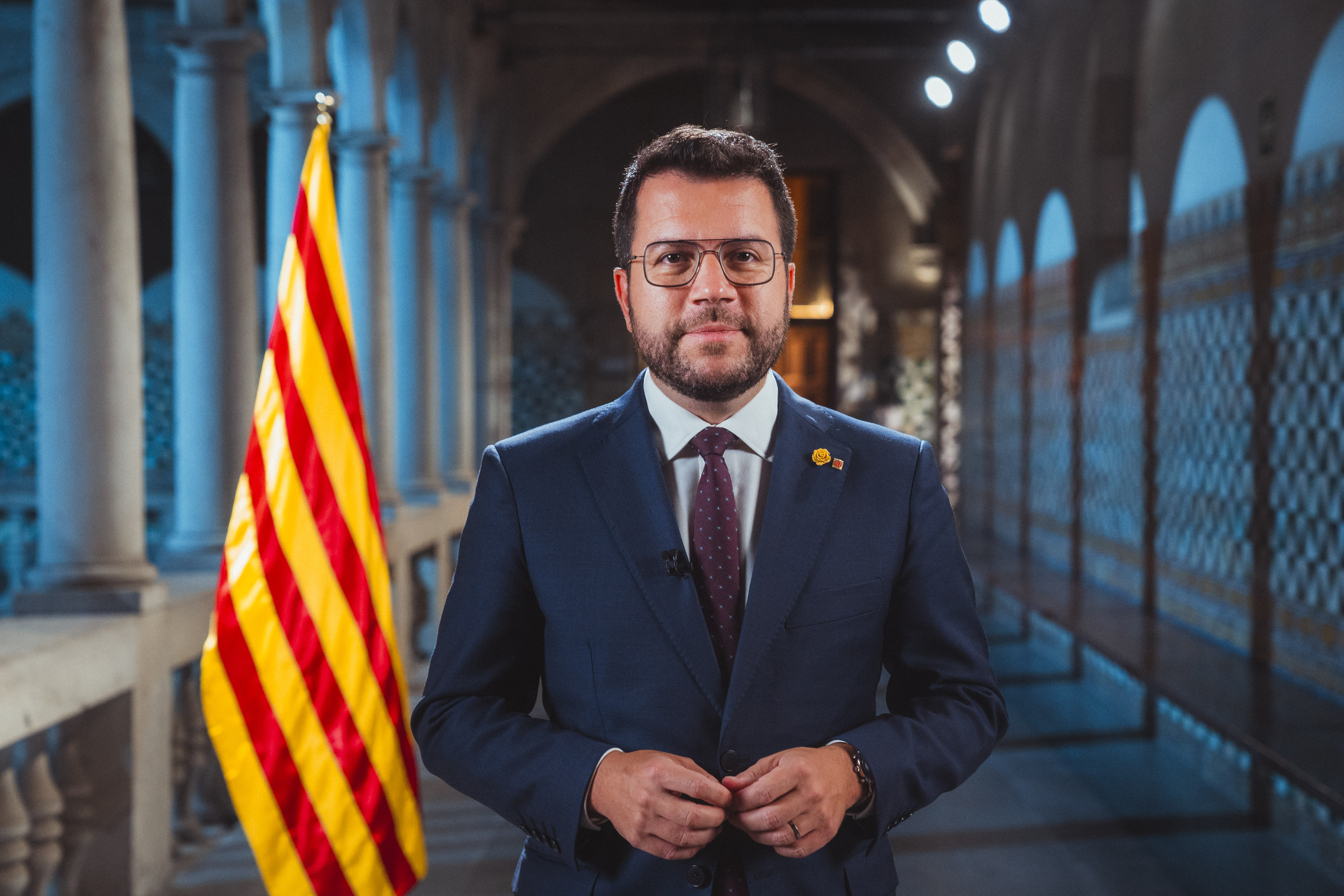- In the institutional message on the occasion of the National Day of Catalonia, he stressed that "Catalonia holds the key to Spain's governability and we must take advantage of this strength to make possible everything that has not been possible until now"
- The President noted that "we are forcing the Spanish Government to take decisive steps towards amnesty, to accept it as essential and inevitable, as we have been demanding since day one"

During the institutional message for the National Day of Catalonia, the President of the Generalitat, Pere Aragonès, emphasised that "amnesty, on its own, does not resolve the conflict of sovereignty with Spain", because "Catalonia wants to vote freely on independence, and until Spain responds to this democratic demand, conflict will exist".
For this reason, he called for "initiating a second phase of negotiation, acting in good faith and aligning strategies, agreeing internally on an inclusive proposal on how the citizens of Catalonia should vote, and jointly defending it before the State to make it possible". And he added that "we have tools to do this, such as the Clarity Agreement".
He also noted that "putting an end to all forms of repression is an indispensable condition for being able to carry out negotiations on an equal footing," and for this reason "we are forcing the Spanish Government to take decisive steps towards amnesty, to accept it as indispensable and inevitable, as we have been demanding from day one. This is the way."
In this new phase of negotiation with the State, the President said, "the way is clear and more and more of us are practising it: firmness, negotiation and democracy". He ended by saying, "To overcome repression once and for all. And to lay the foundations so that the citizens of Catalonia can decide without any limits what the political future of the country should be".
The President stressed that "Catalonia holds the key to Spain's governability" and said that we must "take advantage of this strength to make possible everything that was not possible until now". In this sense, he referred to "amnesty as a guarantee that no one else will be sent to prison and that the exiles will be able to return in freedom", as well as to "the immediate improvement of citizens' well-being with measures such as the transfer of the Rodalies train lines and the end of the fiscal deficit".
"We know that nothing is impossible", the President said, and that "if we join forces and work together we will have much more strength to take advantage of all the opportunities that are open to us", such as the results of the last elections in the Congress of Deputies. "We can do it," he stressed, "with the strength we have as a country we must make the amnesty possible; we must make possible an immediate improvement in the well-being of citizens, and give new impetus to negotiations with the State to lay the foundations for Catalonia to vote".
At different points in the message, President Aragonès referred to a Catalonia that is about to reach 8 million inhabitants, which, he said, "is the most plural and diverse that has ever existed". He said that "we must be able to offer all our fellow citizens the possibility of a full life". To do so, he added, "collectively we must overcome the limitations that prevent us from freely determining our future as a people". And he gave as examples the fiscal deficit, "which prevents us from having the welfare state we deserve", and "infrastructure managed from outside our territory, such as the case of Rodalies, which every day becomes an added toll for many of its users".
Giving a new boost to the Catalan language
This year, in which the Catalan Government dedicated the National Day to the Catalan language with the slogan "One language, many accents", the President sent his traditional institutional message from the Institut d'Estudis Catalans (IEC), the normative reference body for the Catalan language as a whole, founded in 1907 by Enric Prat de la Riba.
In this respect, the President of the Generalitat emphasised during his message the importance of "giving new impetus to the Catalan language, the pillar of the nation and an essential element for the social cohesion of the country". And he stressed that "steps such as making Catalan an official language of the European Parliament and in European institutions or being able to use the Catalan language normally in the Congress of Deputies are extremely important and represent a great step forward towards the full national recognition of Catalonia".
Solidarity with the people of Morocco
Pere Aragonès opened his speech with words of"support, affection and solidarity with the people of Morocco, the country of origin of so many of our fellow citizens, who are victims of an earthquake that has taken the lives of so many people and left a great many injured". The President extended his condolences to the victims and their families and expressed his conviction that "once again the people of Catalonia will show their solidarity with the peoples affected by humanitarian catastrophes".
